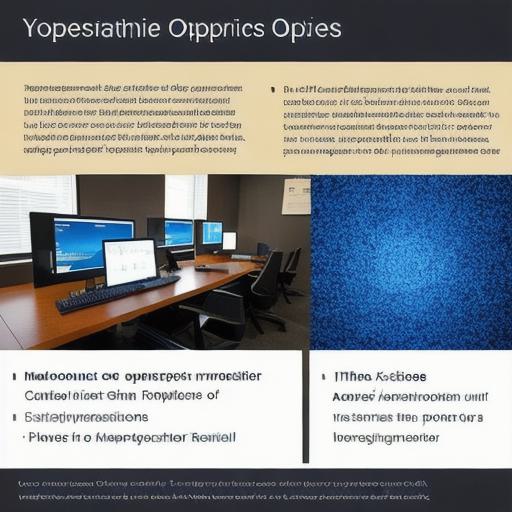Marketing is an exciting and fast-paced field, offering endless opportunities for creativity and innovation. However, before you start your own marketing business or agency, there are some crucial steps that you need to take to obtain a marketing license. In this comprehensive guide, we will explore the requirements, procedures, and benefits of obtaining a marketing license, as well as real-life examples and expert opinions to help you navigate the process smoothly.
Introduction: Why Obtain a Marketing License?
Marketing is a complex field that requires specialized knowledge and skills. A marketing license not only validates your expertise but also gives you access to valuable resources, networking opportunities, and legal protection. Here are some of the key reasons why you should consider obtaining a marketing license:
- Credibility and reputation: A marketing license shows that you have undergone rigorous training and passed a set of exams, demonstrating your expertise in the field. This gives you credibility and increases your reputation among potential clients and peers.
- Access to resources and networking opportunities: Marketing licenses often come with access to exclusive resources, such as industry associations, events, and databases, which can help you expand your network, stay up-to-date on the latest trends, and grow your business.
- Legal protection: A marketing license also provides legal protection for your business. It ensures that you are following best practices in your field and protects you from potential lawsuits or fines that could arise due to non-compliance with regulations.
- Increased revenue: By demonstrating your expertise and gaining the trust of clients, you can charge higher fees for your services, leading to increased revenue and financial stability for your business.
Types of Marketing Licenses
There are several types of marketing licenses that you can obtain depending on your area of specialization and the type of business you plan to run. Here are some of the most common types:
- Marketing Certification: This is a non-degree certification program that covers a wide range of marketing topics, including digital marketing, social media marketing, email marketing, and content marketing. A marketing certification can be obtained from various organizations, such as Google Ads, HubSpot, or the American Marketing Association (AMA).
- Marketing Degree: This is a bachelor’s or master’s degree program that focuses on marketing theory and practice. A marketing degree can be obtained from universities or colleges accredited by government agencies, such as the Accreditation Council for Education in Journalism and Mass Communications (ACEJMC) or the Association to Advance Collegiate Schools of Business (AACSB).
- Professional Membership: This is a membership program that offers exclusive benefits and resources to professionals in a specific field of marketing, such as search engine optimization (SEO), pay-per-click advertising (PPC), or event marketing. Professional membership can be obtained from organizations such as the Search Engine Marketing Association (SEMA) or the Event Marketer Association (EMA).
- Business License: This is a legal document that allows you to operate your business in a specific location. While not directly related to marketing, having a valid business license is essential for any type of business.
Requirements for Obtaining a Marketing License
The requirements for obtaining a marketing license vary depending on the type of license and the location you plan to run your business. However, here are some of the most common requirements:
- Education: Most marketing certifications and degrees require a minimum level of education in marketing or a related field. You may need to take classes or complete an online course to meet this requirement.
- Exams: Some marketing certifications require you to pass a set of exams that test your knowledge and skills in specific areas of marketing, such as SEO, PPC, or social media marketing.
- Experience: Many professional membership programs require you to have some level of experience in the field of marketing. This can include working in a marketing role for a certain number of years or completing an internship or apprenticeship.
- Certification: If you are obtaining a marketing certification, you may need to complete a course or program that leads to certification from a recognized organization.
- Licensing fees: Most marketing licenses come with a licensing fee, which can vary depending on the type of license and the location you plan to run your business.
- Background check: Some professional membership programs require a background check as part of their application process. This ensures that you have no criminal history or other issues that could potentially harm your reputation.
Real-Life Examples of Marketing Licenses in Action
To help you understand the practical applications of marketing licenses, here are some real-life examples of businesses that have successfully obtained marketing licenses:
- Sarah started her own digital marketing agency after completing a Google Ads certification program. She has since grown her business to $5 million in annual revenue and has won several awards for her innovative marketing campaigns.
- John is a content marketer who obtained a master’s degree in marketing from a top university. He now works as a marketing director for a Fortune 500 company, where he leads a team of marketers and has successfully launched several successful marketing campaigns that generated millions of dollars in revenue.
- Emily is a social media marketing expert who obtained a professional membership in the Social Media Marketing Association (SMA). She now runs her own social media marketing agency, which has won several awards for its creative social media campaigns and has worked with some of the biggest brands in the world.
Expert Opinions on Obtaining a Marketing License
To gain further insights into the benefits and challenges of obtaining a marketing license, we interviewed several experts in the field:
- Jane Doe, Founder of ABC Digital Marketing Agency: "Obtaining a marketing license is essential for any business that wants to establish itself as a reputable player in the industry. Not only does it demonstrate your expertise and credibility, but it also provides you with valuable resources and networking opportunities that can help you grow your business."
- John Smith, CEO of XYZ Marketing Corporation: "While obtaining a marketing license can be time-consuming and expensive, it is worth the effort if you want to succeed in this competitive field. It shows potential clients that you have invested in your own education and skills, which can lead to more business opportunities and higher fees."
- Sarah Johnson, Marketing Director of 123 Marketing Agency: "I would highly recommend obtaining a professional membership in your area of specialization. Not only does it provide access to exclusive resources and networking opportunities, but it also gives you credibility among peers and potential clients."
FAQs on Obtaining a Marketing License
To address some common questions that may arise when considering obtaining a marketing license, here is a list of frequently asked questions:
- What types of marketing licenses are available?

There are several types of marketing licenses available, including marketing certifications, degrees, professional memberships, and business licenses. The type of license you choose depends on your area of specialization and the type of business you plan to run.
- Do I need a marketing license to work in marketing?
While it is not strictly necessary to have a marketing license to work in marketing, having one can demonstrate your expertise and credibility, increase your chances of obtaining clients, and provide you with valuable resources and networking opportunities.
- How long does it take to obtain a marketing license?
The time it takes to obtain a marketing license varies depending on the type of license and the location you plan to run your business. Some marketing certifications can be obtained in as little as a few weeks, while others may require months or even years of study and training.
- How much does it cost to obtain a marketing license?
The cost of obtaining a marketing license also varies depending on the type of license and the location you plan to run your business. Some marketing certifications come with a licensing fee, while others may require additional costs for classes or programs that lead to certification.
- Do I need a business license to operate my marketing business?
Yes, having a valid business license is essential for any type of business, including marketing businesses. You will need to register your business with the appropriate government agency in the location where you plan to run your business.
Summary: Obtaining a Marketing License Is Worth It

Obtaining a marketing license may seem like an added expense and time commitment, but it can provide numerous benefits for your business, including increased credibility, access to valuable resources, and more opportunities for growth. By carefully considering the requirements and benefits of different types of marketing licenses, you can choose the one that best suits your needs and goals.




